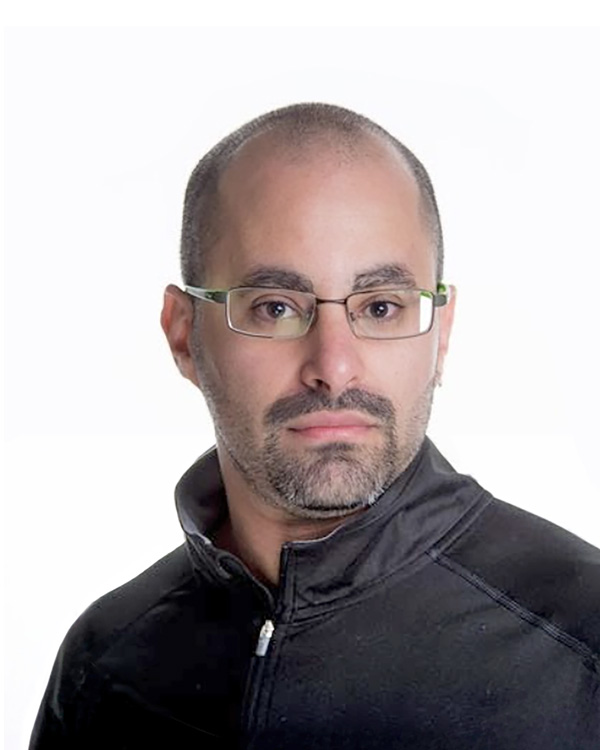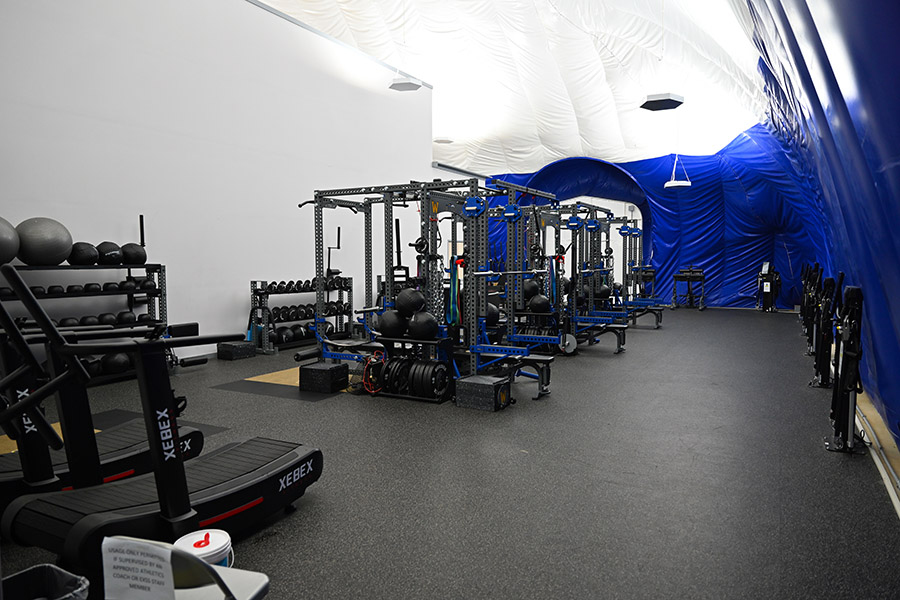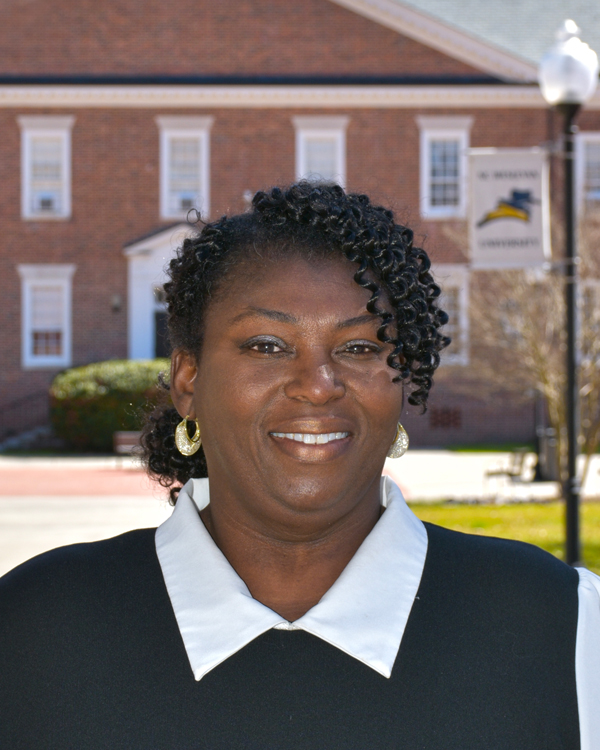Be a Strength and Conditioning and Sports Science Professional
Master of Science in Human Performance & Sports Science
Take your passion for sports, fitness, and human performance to the next level with our Master of Science in Human Performance and Sport Science. This cutting-edge program blends scientific principles with practical applications to help you enhance athletic performance, improve health outcomes, and lead in the dynamic fields of sports science and fitness.
The coursework in the MHPSS program focuses on practical and face-to-face experiences to enhance skill-building and understanding. Curriculum features a combination of content-based knowledge, practical application, and certifications to prepare students for entry into the strength and conditioning field. Students will have to plan on being in-person/on campus 5 days a week with varying times.
- Combination of classroom and practical training (working with athletics)
- Students can work part time but will need employment that is flexible
Highlights of the MSHPSS Program:
-
38-hour program
-
Complete in as-little-as 15 months
-
16-week courses
-
Hybrid & seated classes
-
Classroom and practical training
A Balanced Sports Science Curriculum
In-Depth Curriculum: Our program offers courses in exercise physiology, biomechanics, sports science, advance conditioning methods, and performance analysis. You’ll gain a strong foundation in both theory and practice, equipping you to address the physical and mental demands of human performance.
Hands-On Learning: With state-of-the-art labs and access to the latest technology, you’ll apply classroom knowledge in real-world environments. From performance testing to designing training programs, our hands-on approach prepares you for success.
Expert Faculty: Learn from experienced professionals who are leaders in the field of sports science and human performance. Our faculty are committed to mentoring you throughout your academic journey.
Practical Learning Environments at NC Wesleyan University
Where Learning Meets Real-World Experience
At North Carolina Wesleyan University, we believe that education should go beyond the classroom. That’s why we emphasize Hands-On Learning, Practical Application Experiences, and Experiential Learning across all disciplines. Whether you’re in the lab, on the field, or in the community, you’ll gain the skills and confidence needed to thrive in your future career.
State-of-the-Art Labs & Performance Spaces
Our campus is home to state-of-the-art labs and performance facilities designed to simulate real-world environments. From our cutting-edge Exercise Science and our Human Performance Lab, students engage in research, testing, and analysis that mirror professional settings. These spaces are equipped with the latest technology to support data collection, biomechanics, and physiological assessments.
Strength and Conditioning Coaching in Action
NCWU’s commitment to experiential learning shines in our athletic and coaching programs. Students in Human Performance & Sports Science, Sports Administration, Exercise Science, and related fields gain direct experience through:
- On-campus internships with our NCAA Division III athletic teams
- Coaching practicums with local high schools and community sports organizations
- Collaborative projects with athletic trainers and strength coaches
- Real-time performance analysis using motion capture and wearable tech
These opportunities allow students to apply classroom knowledge in dynamic, real-world scenarios—preparing them for careers in coaching, athletic training, physical therapy, and beyond.
Community Partnerships That Make a Difference
We’ve built strong partnerships with local hospitals, rehabilitation centers, and athletic programs to provide students with practical application experiences that matter. Whether you’re shadowing a physical therapist, assisting in a youth sports clinic, or conducting wellness assessments in the community, you’ll be making an impact while building your professional network.
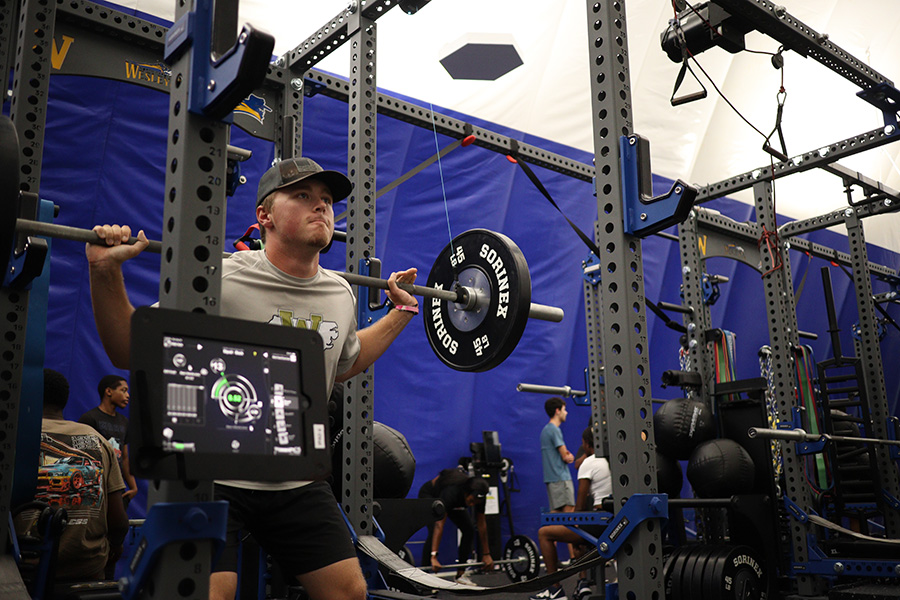
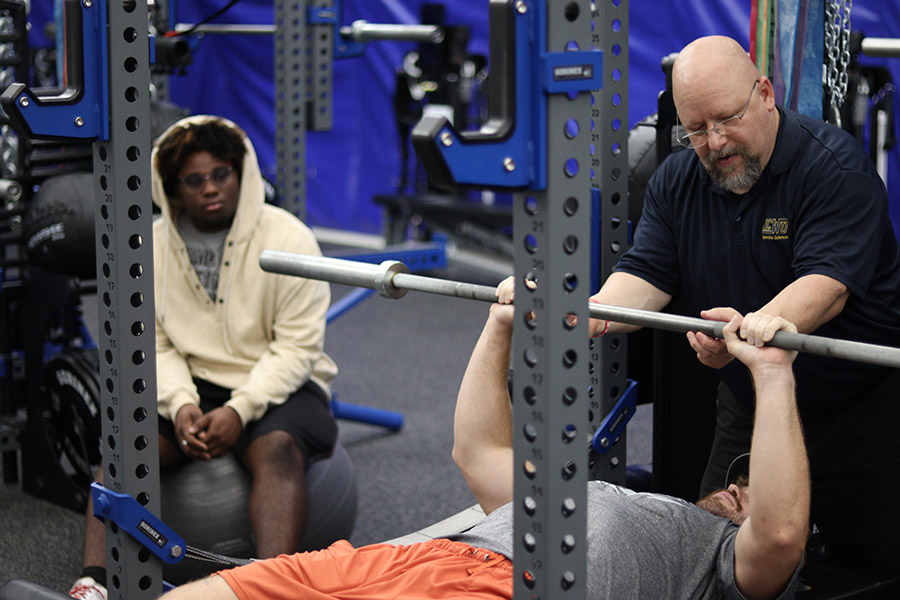
Program Features & Highlights:
Convenient
Seated & online classes! Balance work, home and school and still enjoy hands-on, experiential learning all on one campus.
Hands-on Experience
Apply relevant classroom theory to real-world problems and what you are learning in your current position immediately.
Affordable
NC Wesleyan’s graduate tuition rates are extremely competitive compared to other graduate schools in the U.S.
Experienced
Our faculty has real-world professional experience to ensure you are challenged and supported through practical coursework.
MS in Human Performance and Sports Science Program Overview
Application deadline for each fall semester: August 7
To apply for the NC Wesleyan University MS in Human Performance and Sports Science, you will need:
Requirements:
- Completed NCWU application
- Official undergraduate transcripts
- An accredited undergraduate degree
- Two Professional/Academic recommendations
- Resume/Curriculum Vitae
- Complete a statement of purpose (personal essay)
- Minimum undergraduate GPA 3.0
Note: Graduate school applicants with a cumulative GPA below 3.0 may still be considered based upon other factors submitted in the application.
Program Prerequisites
Students must have earned a baccalaureate degree in exercise science/kinesiology, or its equivalent, from an institution accredited by an agency recognized by the U.S. Department of Education.
If earned baccalaureate degree is NOT in exercise science/kinesiology, students must complete the following undergraduate coursework before formal admission into the program and registration to graduate courses:
- Exercise Physiology
- Kinesiology and Biomechanics
- Basic Nutrition
- Research and Statistics in Exercise Science (Statistics)
- Techniques in Evaluating Fitness (exercise testing)
- Methods of Strength and Conditioning (resistance training)
- Anatomy and Physiology (minimum of 4 credits)
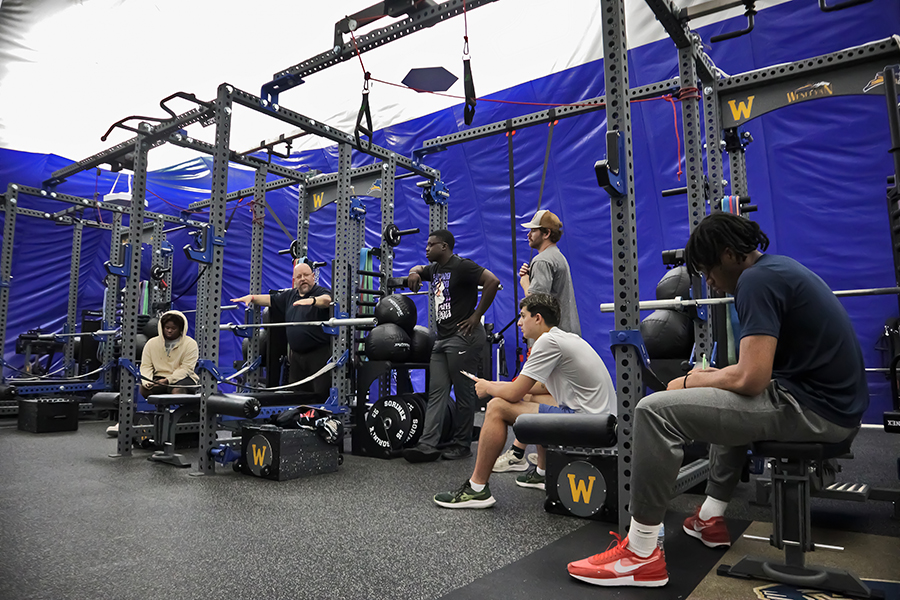
Data-Driven Performance: Enhancing Outcomes Through Sport Science Technology
At NC Wesleyan University, our Master of Science in Human Performance & Sports Science program integrates cutting-edge Sport Science Technology and Data Science in Sports to elevate athlete development and performance.
Turning Data Into Action
Students gain hands-on experience in data collection, interpretation, and feedback mechanisms that are essential for optimizing athletic outcomes. Through coursework and lab-based learning, you’ll explore how to:
- Collect real-time performance data using wearable tech and motion analysis tools
- Analyze Performance Indicators (KPIs) such as speed, power output, heart rate variability, and recovery metrics
- Use Athlete Monitoring systems to track training loads, fatigue, and readiness
- Apply findings to create individualized training plans and injury prevention strategies
Tools & Technologies That Power Performance
Our program leverages a range of tools and platforms to support Sports Performance Assessment, including:
- Excel-based performance modeling for tracking trends and forecasting outcomes
- Heart rate monitors and GPS tracking systems for real-time athlete monitoring
- Video analysis software for biomechanical assessments
- Force plates and timing gates for measuring explosive power and agility
- Custom dashboards for visualizing KPIs and communicating insights to coaches and athletes
Bridging Science and Coaching
By combining scientific rigor with practical application, our students learn to translate complex data into actionable strategies. Whether you’re working with elite athletes or community sports programs, you’ll be equipped to make evidence-based decisions that drive performance and reduce injury risk.
Graduate students in the MHPSS program will have the opportunity to learn and train other athletes using state-of-art exercise equipment and sports science technologies.
Sports Science Technologies
- Kinetisense – movement analysis
- CoachMePlus – athlete management system
- GymAware – velocity based training
- Keiser 400 series multi-trainers
- Hawkins Force Plates
- Output Sports Sensors
- Dashr Timing System
Build Expertise in Exercise Science
The MS in Human Performance and Sports Science at NCWU combines core principles of exercise science with focused training in sports performance. This graduate program includes advanced coursework in exercise physiology, biomechanics, corrective exercise, and strength and conditioning – all designed to support the demands of competitive and recreational athletes.
A dedicated three-course sports science sequence allows students to build expertise in data collection, statistical analysis, and applied decision-making. These courses emphasize the use of technology in real-time performance tracking and prepare students for professional certifications, including the Certified Performance and Sport Scientist (CPSS) exam.
Students also engage in research and hands-on learning with tools used across the sports performance industry. Through this applied approach, the program meets the needs of professionals seeking a master’s degree in sports science that aligns with current practice and technology. Graduates leave prepared to lead athlete-centered programs informed by evidence-based strategies, human movement analysis, and sport-specific performance goals.
Sports Science Preparation
The MHPSS program will have provide foundational preparation for NSCA Certified Performance and Sport Science (CPSS) certification exam (additional practicum hours are required to sit for CPSS exam)
Three sports science courses will cover the material in the NSCA Essentials of Sport Science text which prepares students to take the NSCA Certified Performance and Sports Scientist (CPSS) certification on their own after they graduate.
Sports Science 1 will focus on sports science data collection (research methods aspect of sports science) and statistics/analytics.
Sports Science 3 will serve as the capstone course integrating the completion and presentation of capstone projects.
Real-World Learning and Lab Experiences
The curriculum includes structured practicum and internship experiences to support the CASCE 300-hour requirement, giving students guided opportunities to apply theory in supervised settings. Courses are delivered through a combination of in-person and hybrid formats. This structure allows students to complete immersive lab and coaching experiences while also managing coursework on a flexible schedule. This blend of classroom instruction and applied fieldwork prepares students to use sport science technologies in a way that supports performance improvement, injury prevention, and team readiness.
For those seeking an MS in Human Performance and Sports Science with practical application at its core, NCWU offers a focused and supportive learning environment. This program is ideal for professionals who want to deepen their experience in data-driven performance coaching, integrate analytics into program design, and contribute to athlete development at every level.
Human Performance & Sports Science (MS) Fifteen-Month Master’s Degree Plan
The North Carolina Wesleyan University Master of Science in Human Performance and Sport Science is 38 credits in total. The curriculum features:
- A three-course sports science series
- Three exercise science courses
- Two specific strength and conditioning courses
- A series of internship and practicum experiences
For students continuing on from the undergraduate program, the program will be 30 credits during the 15 months that they are in the graduate program since they can take the two four-credit strength and conditioning courses senior year.
The curriculum is specifically designed to meet the standards defined by the Council on Accreditation of Strength and Conditioning Education (CASCE) with the intension of the program attaining future CASCE accreditation.
The three sports science courses will cover the material in the NSCA Essentials of Sport Science text which prepares students to take the NSCA Certified Performance and Sports Scientist (CPSS) certification on their own after they graduate. Sports Science 1 will focus on sports science data collection (research methods aspect of sports science) and statistics/analytics. Sports Science 3 will serve as the capstone course integrating the completion and presentation of capstone projects.
The student capstone project is woven through the three sports science courses. This project will emphasize the application of sports science by utilizing data gathered from training athletes and interpreting data using sport analytics. Results will be presented to demonstrate how data can be used to drive informed decision-making in a high-performance training model (collaborative model where all stakeholders are involved).
The exercise science sequence will include the more traditional exercise science courses. Advanced exercises physiology, biomechanics, the topics course make up the exercise science sequence. The topics course will cover the sports nutrition and sports psychology CASCE requirements.
The strength and conditioning coaching sequence will include a coaching course, two strength and conditioning-specific theory/application courses, and a corrective exercise course. The coaching human performance course will cover best practices in coaching and how to design and operate strength and conditioning facilities. The advanced corrective exercise course will train students in how to utilize the functional movement screen and original strength system to assess and enhance movement.
The two strength and conditioning courses will be designed to coordinate with the undergraduate courses. This will allow for the courses to be transferred into the graduate program by students who want to continue their education at Wesleyan by moving directly from the undergraduate exercise science program into the master’s program. The undergraduate courses will be three credits and the graduate courses will be four credits. They would share two credits of common practical and basic programming content.
The undergraduate course will have a series of classroom sessions as touch points to reinforce information from virtual lectures for the one-credit lab or module. The graduate students will have a two-credit lab or module where additional advanced content is covered. The Advanced Methods of Strength and Conditioning will incorporate more advanced programming methods and the USAW level 1 certification will be integrated into the course. Advanced Conditioning Methods will add HIIT science to the undergraduate material. Both courses will feature assignments that are designed at a higher level for the master’s students than the undergraduate students.
The internship / Practicum series will include eight credits of internship/practicum experience to meet the 300-hour CASCE accreditation requirement. One-credit practicum experiences will be included in each of the three fall and spring semesters, and a five-credit internship will be required in the summer. The one-credit practicums which would focus on running twice a week conditioning circuits for athletics will be under the supervision of the program faculty. By faculty running the practicums, the internship could be done at Wesleyan, assisting with summer programming, supervised by the university’s head strength and conditioning coach summer programming if a student was not able to travel off campus. This would meet the two-placement accreditation requirement since the practicums and internship would have different supervisors and the experiences would be significantly different.
Fall 1 Semester |
|
EXS 510 Sports Science 1 (3) EXS 520 Coaching Human Performance (3) EXS 530 Advanced Methods of Strength and Conditioning (4) EXS 550 Advanced Exercise Physiology (3) EXS 570 Graduate Practicum 1 (1) |
Spring 1 Semester |
|
EXS 531 Advance Conditioning Methods (4) EXS 610 Sports Science 2 (3) EXS 650 Biomechanics (3) EXS 660 Topics in Human Performance and Sport Science (3) EXS 670 EXS Graduate Practicum 2 (1) |
Summer Semester |
| EXS 681 Graduate Internship (3) (Online) |
Fall 2 |
|
EXS 620 Sports Science 3 (3) EXS 635 Advanced Concepts in Corrective Exercise (3) EXS 680 Graduate Practicum 3 (1) |
MS in Human Performance and Sports Science Course Descriptions
Sports Science / Research Sequence
EXS 510 Sports Science 1
This course introduces students to the foundational aspects of sports science. Students will gain an understanding of the high-performance team model and how to identify key performance indicators while how to profile and establish benchmarks in sports. An analytical approach to decision-making will provide sports scientists with useful tools for making sense of data.
EXS 610 Sports Science 2
Students will be exposed to a variety of ways to collect external and internal load data. How to examine and interpret data to make evidence-based decisions in a high-performance team model will be emphasized.
EXS 620 Sport Science 3
An appreciation of complementary methods that are vital to optimizing training will be introduced. This will include recovery, nutrition, neuroscience, motor performance, sports science of injury, and nutrition. Students produce a written paper and oral presentation of work on data from sports performance training demonstrating a deep understanding of sports science principles and practice.
Exercise Science Sequence
EXS 550 Advanced Exercise Physiology
This is an advanced course focusing on integrative physiology and physiological responses to exercise. The course includes sections on energetics, metabolism, and endocrine exercise physiology; skeletal muscle excitation, contraction, and fatigue; cardiovascular and hemodynamics regulation; and respiratory exercise physiology. The course builds on principles and concepts learned in undergraduate courses in the area of physiology and exercise physiology.
EXS 650 Biomechanics
This course will assist human movement professionals (e.g., sports medicine clinicians, exercise scientists, strength and conditioning specialists, etc.) to understand the nature of the structure and function of the human body through quantitative analysis of human motion. It will provide future clinicians/researchers with the necessary knowledge base to objectively evaluate human movement and to understand the theory, concepts, and application of conducting analysis of humans in motion. Students will expand their knowledge regarding quantitative analysis of human motion and the concepts and equipment to collect objective quantifiable data to be used for clinical or research purposes. Lecture and laboratory concepts will be utilized to instruct students on the foundations of biomechanical data collection. Major emphasis will be placed on using 2-D and 3-D motion analysis, force plates, and electromyography.
EXS 660 Special Topics in Human Performance and Sports Science
Contemporary research from a variety of areas related to exercise science and human performance is discussed and explored in this course. Students will focus on relevant issues in the areas of sports nutrition and sports psychology. The course challenges students to analyze and synthesize current and relevant topics and offer solutions to benefit exercise science research and related industries.
Strength and Conditioning Coaching Sequence
EXS 520 Coaching Human Performance
This course will focus on the art and science of coaching by exploring leadership strategies and the development of interpersonal skills. Specific emphasis will be placed on instructional skills related to coaching human performance.
EXS 530 Advanced Methods in Strength and Conditioning
Develop, implement, and analyze exercise techniques, advanced training program designs, organization and administration, and testing and evaluation using scientific principles of strength and conditioning.
EXS 531 Advanced Conditioning Methods
This course will focus on advanced training programs, which will optimize individual and team adaptations in hypertrophy, force production, power development, speed, and agility. The theory of plyometrics, energy system development, and SAQ techniques will be covered as well as the development of annual programs for individual and team sports.
EXS 635 Advanced Methods in Corrective Exercise
Classroom and laboratory experiences that provide an introduction to functional assessment and corrective exercises. Specific topics will include an analysis of common biomechanics of movement and the evidence-based application of functional assessment and assignment of corrective exercises. Students will be introduced to Functional Movement System (FMS) and Original Strength (OS) corrective exercise systems. The course includes FMS Level 1 and 2 and OS certified pro (OS Level 1 & 2 coach) credentials (course fee covers cost of credential).
Practicum / Internship Sequence
EXS 570, EXS 670, and EXS 680 Graduate Practicum 1 – 3
The one-credit practicum courses permit students to apply their academic training under the direction of certified strength and conditioning faculty on campus with university intercollegiate athletes. While classroom input is inherent in educational programs at North Carolina Wesleyan University, the application of academic theory gives the students experiences that will add to their personal and professional maturity. The practicum provides the student with the opportunity to ask pertinent questions, make observations, and supervise. Students must complete a minimum of 50 clock hours per practicum experience.
EXS 681 Graduate Internship
The practicum courses permit students to apply their academic training under the direction of certified strength and conditioning professionals. While classroom input is inherent in educational programs at North Carolina Wesleyan University, the application of academic theory gives the students experiences that will add to their personal and professional maturity. The internship provides the student with the opportunity to ask pertinent questions, make observations, and participate in agency activities. All internship experiences must be undertaken in an agency that guarantees to provide the student with supervision by an exercise specialist or other professional possessing appropriate academic and certification credentials. Students must complete a minimum of 200 clock hours.
Measurable Career Growth and Options
Graduates of NCWU’s MS in Human Performance and Sport Science are prepared for diverse roles, including:
- High School, Collegiate, Private-sector or Professional Strength and Conditioning Coach/specialist
- Sports Science Data Analyst
- Tactical Strength and Conditioning Facilitator
With the knowledge gained through this program, you can pursue careers in professional sports organizations, healthcare facilities, fitness centers, educational institutions, and more.
Statistics (BLS) projects a 9%-14% increase in job opportunities for individuals pursuing a career in this professional field by 2032, far exceeding the average growth rate for all occupations, which is 3% (Statistic, September 6, 2023; Statistics, 2023, September 6, 2023).
NSCA Salary Survey >
4-Year Salary Comparison Across NSCA Audiences >
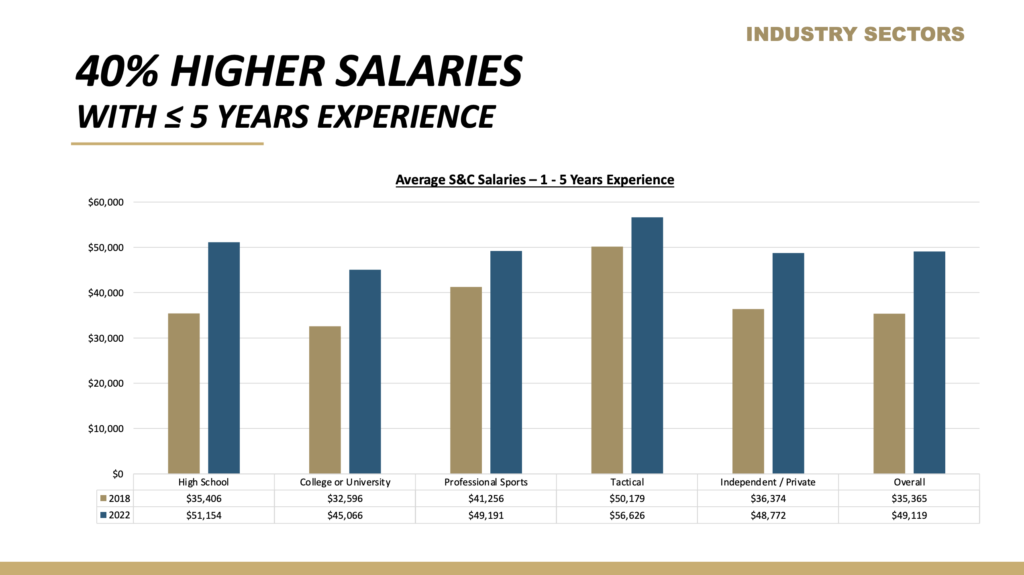
The MS in Human Performance and Sports Science program has academic partnerships with the many nationally know organizations. Upon graduating from NC Wesleyan’s MSHPSS Program, students can acquire the following certifications:
-
USA Weightlifting Level 1* >
-
National Academy of Sports Medicine (NASM) Corrective Exercise Specialist (CES)* >
The program is designed to meet CASCE accreditation standards, once accredited students will be eligible to sit for the NSCA CSCS exam once the 2030 accreditation requirement is in effect.
-
National Strength and Conditioning Association (NSCA) Certified Strength and Conditioning Specialist (CSCS) exams*
-
NSCA CPSS – (MSHPSS program prepares students for the exam but the certification is not included)
*Testing for the above certifications is included with cost of program.
Cost per Credit Hour: $550
Estimated Tuition Cost (example)
Tuition – $20,900 ($550.00 per credit hour x 38 hours)
Program Fee – ($450 per semester) $1,800 (Student Fee and Technology Fee)
Textbooks/Supplies – $600 (for full program)
Parking – No Cost
Estimated Subtotal – $23,300
*Students progressing from the North Carolina Wesleyan University undergraduate exercise science program would be able to transfer eight credits into the program, which would allow two courses to be taken while an undergraduate which would reduce graduate program costs.
Wesleyan Advantage Savings
8 credits transferred in from the undergraduate program
8 credits x $550/credit = $4,400 savings
$20,900 – 4,400 = $16,500 (tuition cost)
$2,400 (books and fees)
Total Wesleyan Advantage Program Cost – $18,900
Why should a student pursue this program? What makes it unique?
What makes this program unique is the Cutting-Edge Research and technology that allows students to stay at the forefront of the latest advances in human performance and sports science. The networking opportunities allow students to build connections with fellow students, alumni, and industry professionals. Plus, students will get personalized support and individualized attention and guidance from faculty and staff.
Does the HPSS Program focus on Strength and Conditioning Fundamentals?
Yes. The MS in Human Performance & Sports Science program at NC Wesleyan University places a strong emphasis on Strength and Conditioning as a core pillar of athletic development. Whether you’re pursuing a career in coaching, athletic performance, or rehabilitation, our curriculum is designed to ground you in the science and application of physical training.
Foundational Principles, Advanced Application
Students explore the physiological, biomechanical, and neurological foundations of strength development and conditioning. Through both classroom instruction and hands-on lab experiences, you’ll learn to:
- Design and implement periodized training programs
- Apply Advanced Conditioning Methods such as velocity-based training, contrast loading, and high-intensity interval training (HIIT)
- Assess and improve movement mechanics, power output, and muscular endurance
- Use performance data to adjust training loads and recovery strategies
Aligned with Career Tracks & Outcomes
This focus supports multiple career pathways, including:
- Certified Strength and Conditioning Specialist (CSCS) preparation
- Performance coaching for collegiate and professional athletes
- Rehabilitation and return-to-play programming
- Tactical strength and conditioning for military and first responders
Students also gain experience with tools such as force plates, timing systems, and wearable tech to monitor progress and refine training strategies.
What are the job prospects with this degree?
An NSCA survey found that average salaries range from $60,527 to $84,575 depending on location, education, certifications, experience, and sector. Source: 4-Year Salary Comparison Across NSCA Audiences – Comparison Of 2018 And 2022 NSCA Salary Survey Data.
Does a student’s undergraduate degree have to be related to this field? Are there pre-requisites for this program?
Students must have earned a baccalaureate degree in exercise science/kinesiology, or its equivalent, from an institution accredited by an agency recognized by the U.S. Department of Education.
If earned baccalaureate degree is NOT in exercise science/kinesiology, students must complete the following undergraduate coursework before formal admission into the program and registration to graduate courses:
Exercise Physiology, Kinesiology and Biomechanics, Basic Nutrition, Research and Statistics in Exercise Science (Statistics), Techniques in Evaluating Fitness (exercise testing), Methods of Strength and Conditioning (resistance training), and Anatomy and Physiology (minimum of 4 credits).
What undergraduate GPA do I need to apply to this program?
Students must have earned a baccalaureate degree, or it’s equivalent, from an institution accredited by an agency recognized by the U.S. Department of Education, with a minimum of a 3.0 overall GPA (on a 4.0 scale).
*Note: Graduate school applicants with a cumulative GPA of 2.75 may be conditionally admitted
Does this program require a graduate record examination (GRE) for admission?
The GRE is not required for admission to this program.
Are the courses for this program synchronous or asynchronous?
Most courses in this program will require synchronous meetings in order to foster peer discussion, feedback, and review with the faculty instructor. Students will have to plan on being in-person/on campus 5 days a week with varying times.
- Combination of classroom and practical training (working with athletics)
- Students can work part time but will need employment that is flexible
Some of coursework will be asynchronous, which allows you to learn on your own schedule, within a certain time frame. You can access and complete lectures, readings, homework and other learning materials at any time
Are there any on-campus requirements such as on-campus meetings, orientation, etc.?
Most courses in this program will require on campus meetings in order to foster peer discussion, feedback, and review with the faculty instructor. Students will have to plan on being in-person/on campus 5 days a week with varying times.
Is there an opportunity for hands-on experience during this program?
Yes, there will be opportunities to apply relevant classroom theory to real-world problems during the course of this program. Students will also be able to apply what they are learning to their current position immediately while enhancing their resume with experiences and knowledge for career growth.
The internship/practicum series will include eight credits of internship/practicum experience which provides 300 hours of hands-on learning experience. One-credit practicum experiences will be included in each of the three fall and spring semesters, and a three-credit internship will be required in the summer. The one-credit practicums which would focus on running twice a week conditioning circuits for athletics under the supervision of the program faculty, in addition to working with intercollegiate athletic teams. The summer internship is intended to be off campus, however, if needed an on-campus internship experience could be offered. The goal of the internships and practicums is to provide students with a variety of learning experiences.
Does this program require a graduate thesis?
The MSHPSS program will require students to complete a capstone project that integrates the technical and scientific knowledge they have gained throughout the program.
The student capstone project would be woven through the three sports science courses. This project will emphasize the application of sports science by utilizing data gathered from training athletes and interpreting data using sport analytics. Results will be presented to demonstrate how data can be used to drive informed decision-making in a high-performance training model (collaborative model where all stakeholders are involved)
How long will it take to complete the MSHPSS program?
Master of Science in Human Performance and Sport Science will be 38 credits in total and students complete the program over the course of Fall, Spring, and Summer I, for a total of about 15 months.
Faculty & Staff
Email any of our advisors with any questions you have about completing this program.
Vanessa Batchelor, MS, NSCA-CSCS, NSCA-CPSS, USA-W L1
Visiting Instructor of Exercise Science, Graduate Program Field Experience Coordinator and Strength & Conditioning Coach
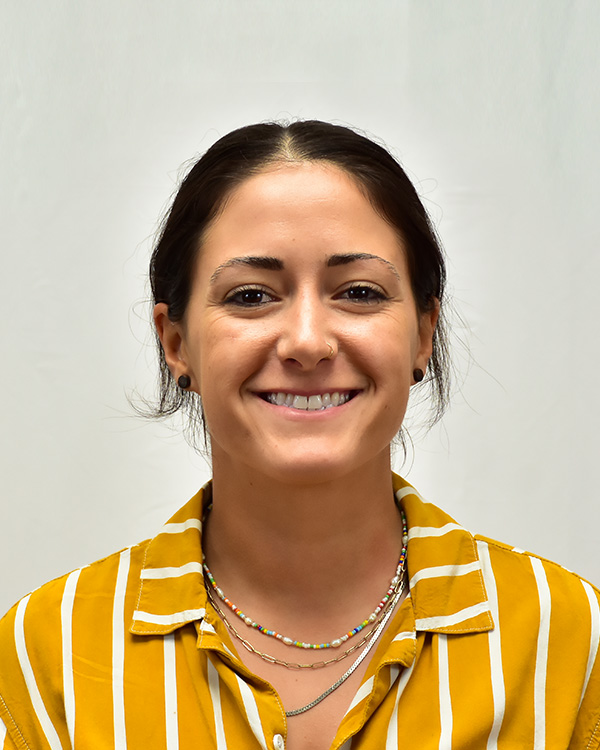
Vanessa Batchelor, MS, NSCA-CSCS, NSCA-CPSS, USA-W L1
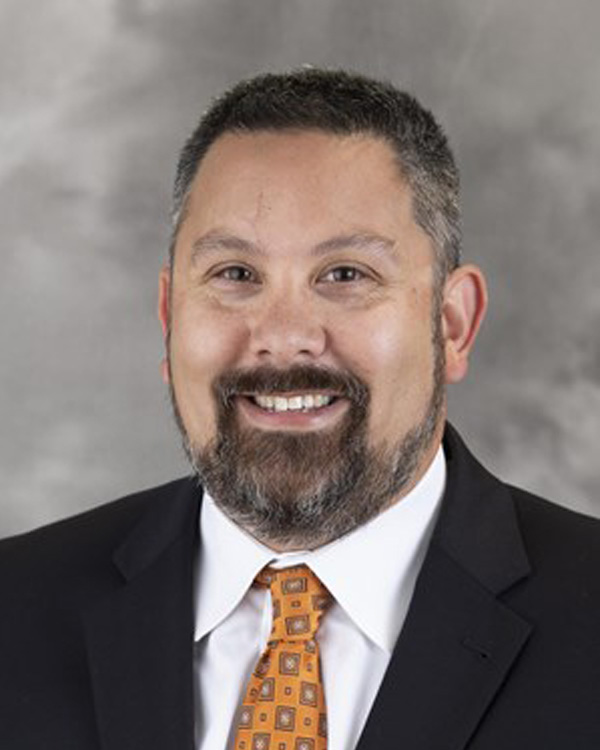
Andrew Carter, Ed.D., CSCS
Tim Dornemann, Ed.D., CES, PES, CSCS, CPSS OS Pro
Associate Professor of Exercise Science, Director of the MS-HPSS Program

Tim Dornemann, Ed.D., CES, PES, CSCS, CPSS OS Pro
Meir Magal, Ph.D., ACSM-CEP, NSCA-CSCS, FACSM
Inaugural Souza Professor of Exercise Science/Chair, School of Math and Science/Program Coordinator, Exercise Science
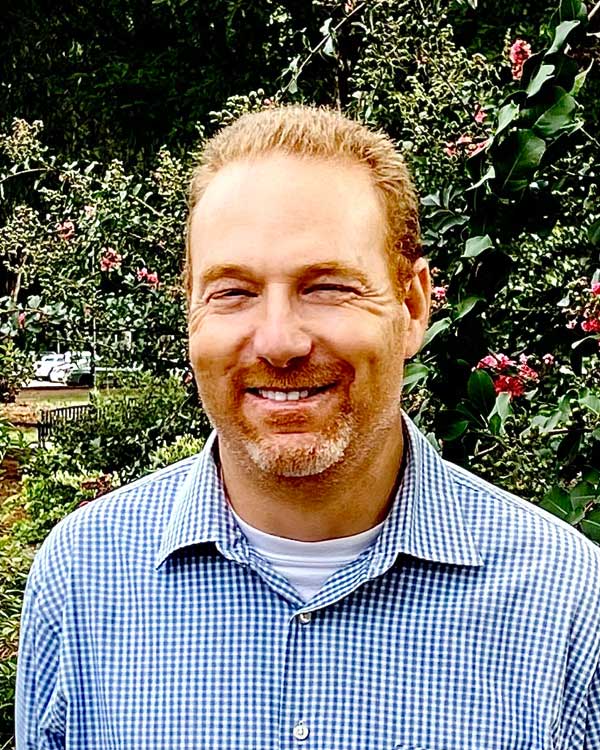
Meir Magal, Ph.D., ACSM-CEP, NSCA-CSCS, FACSM
